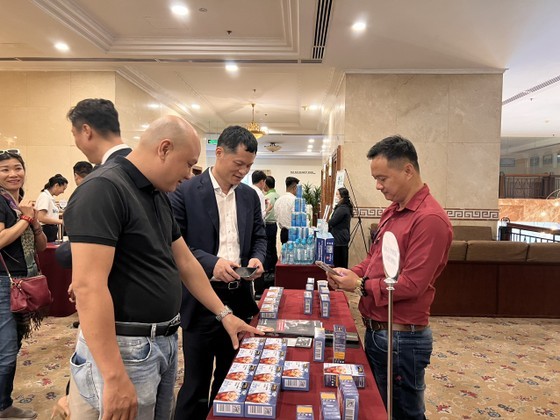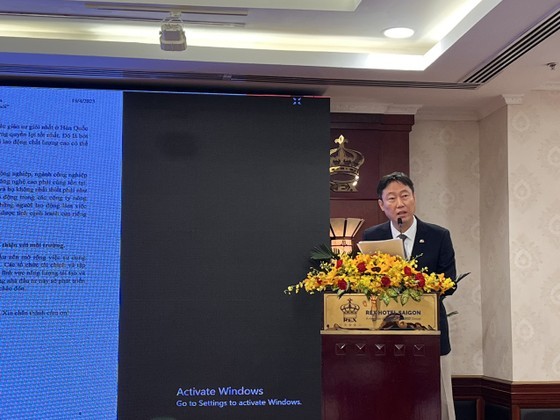 |
Mr. Do Quoc Hung, Deputy Director of the Asia-Africa Market Department under the Ministry of Industry and Trade, discusses with businesses about export conditions to Japan and Korea. (Photo: SGGP) |
This proposal was made during the seminar titled "Promoting trade relations between Vietnam and the Japanese and Korean Markets in the new situation," which was organized by the Ho Chi Minh City Center for International Integration Support (CIIS) in collaboration with the Investment and Trade Promotion Center of HCMC (ITPC) on April 19, in HCMC.
During the seminar, Mr. Do Quoc Hung, Deputy Director of the Asia-Africa Market Department under the Ministry of Industry and Trade, highlighted that Japan and Korea are vital and long-standing trading partners and hold significant potential as export markets for Vietnamese enterprises, particularly those based in HCMC. According to Mr. Hung, Japan currently ranks as the 4th largest trading partner of Vietnam (after China, Korea, and the US), while Korea is a comprehensive strategic partner of Vietnam and is ranked as Vietnam's third-largest trading partner (after China and the US) as of 2022.
Mr. Hung also pointed out immense potential and opportunities for exporting textiles, footwear, agricultural, and aquatic products to the Japanese and Korean markets. However, despite Vietnam having signed and implemented several FTAs with Japan, such as AJCEP, VJEPA, CPTPP, and RCEP, and with Korea, such as AKFTA, VKFTA, and RCEP, the proportion of Vietnam's goods export turnover in the total import turnover of these markets remains modest, accounting for only 2.7 percent and 3.3 percent, respectively. This indicates that Vietnamese goods still have significant opportunities for expansion and growth in the Japanese and Korean markets.
 |
Mr. Choi Kyu Chul, Vice President of the Korean Chamber of Industry and Trade in HCMC, speaks at the event. (Photo: SGGP) |
Mr. Pham Binh An, Deputy Director of the HCMC Institute for Development Studies, shared his insights regarding the economic forecast for 2023. He mentioned that the global and domestic economic context is likely to witness rapid and unpredictable developments, including increased inflationary forces, reduced import demand, and difficulties for enterprises in securing capital. Additionally, fluctuating petrol and oil prices, as well as raw materials, are also expected to pose challenges to the production, business, and import-export activities of enterprises.
To enhance enterprises' export capacity, Vietnam must focus on building high-quality human resources and investing in infrastructure development, including roads, ports, and airports, using social capital. There is also a need to expand investments in supporting industries such as materials and components. Mr. Choi Kyu Chul, Vice President of the Korean Chamber of Industry and Trade in HCMC, stressed that the Vietnamese government should introduce new policies to support industries and businesses, especially those that develop in an environmentally friendly direction, to further develop in the future.
























